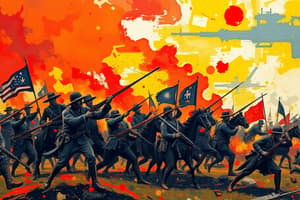Podcast
Questions and Answers
What was the first major battle of the Civil War, and which side won?
What was the first major battle of the Civil War, and which side won?
The first major battle of the Civil War was the First Battle of Bull Run and the Confederates won.
Who became the leader of the main Union army, and what was this army called?
Who became the leader of the main Union army, and what was this army called?
The leader of the main Union army was George B. McClellan and his army was called the Army of the Potomac.
Who became the new leader of the Confederate army, and what skills did he bring to the job?
Who became the new leader of the Confederate army, and what skills did he bring to the job?
The new leader of the Confederate army was Robert E. Lee and he was a risk taker and graduated from West Point.
Describe the Seven Days' Battles and the outcome.
Describe the Seven Days' Battles and the outcome.
How did Jackson's defeat of General Pope's Union forces at the Second Battle of Bull Run affect Lee's plans?
How did Jackson's defeat of General Pope's Union forces at the Second Battle of Bull Run affect Lee's plans?
Who was the leader on each side in the Battle of Antietam, and which side won?
Who was the leader on each side in the Battle of Antietam, and which side won?
What part did error and chance play in the Union's victory at Antietam?
What part did error and chance play in the Union's victory at Antietam?
Which side held the naval advantage in the war, and why?
Which side held the naval advantage in the war, and why?
Why might control of the sea benefit a power at war?
Why might control of the sea benefit a power at war?
How did the ironclads signal a revolution in naval warfare?
How did the ironclads signal a revolution in naval warfare?
Flashcards are hidden until you start studying
Study Notes
Major Battles and Leadership
- The First Battle of Bull Run marked the initial major conflict of the Civil War, resulting in a Confederate victory.
- George B. McClellan took command of the primary Union force, known as the Army of the Potomac.
- Robert E. Lee became the leader of the Confederate army, noted for his tactical risk-taking and his West Point education.
Seven Days' Battles
- The Seven Days' Battles were a sequence of confrontations initiated by the Confederate army.
- These battles culminated in a victory for the Confederates, forcing Union forces under McClellan to withdraw.
Impact of the Second Battle of Bull Run
- Jackson's success against General Pope's Union troops at the Second Battle of Bull Run led Lee to shift his strategy, moving the conflict northward.
Battle of Antietam
- The leaders of the Battle of Antietam were McClellan for the Union and Lee for the Confederates.
- The Union emerged victorious in this pivotal battle.
- Errors and chance significantly influenced the outcome, with Lee’s army weakened and inadvertently divided due to his focus on attacking Harper's Ferry.
Naval Warfare
- The North had a significant naval advantage due to a greater number of naval resources and weaponry.
- Control of the seas allowed for the transportation of goods and supplies essential for military operations.
- The introduction of ironclads represented a transformative shift in naval combat, signaling the end of the era dominated by wooden warships powered by sails.
Studying That Suits You
Use AI to generate personalized quizzes and flashcards to suit your learning preferences.




